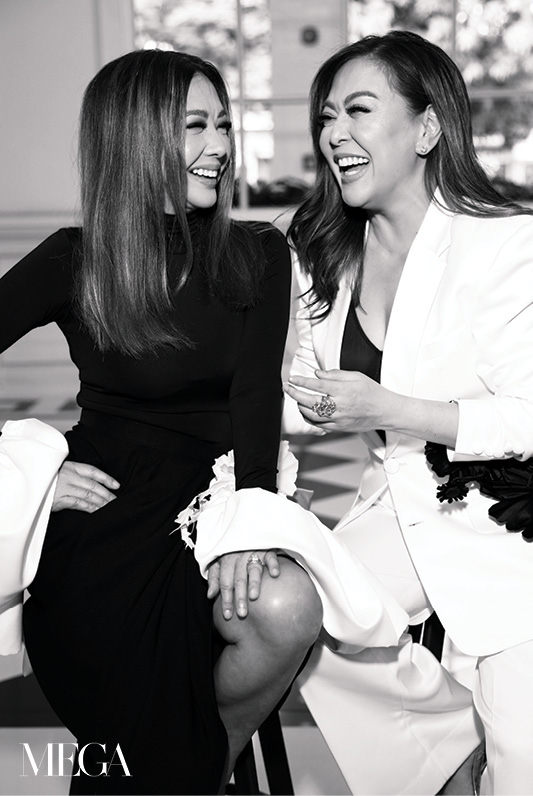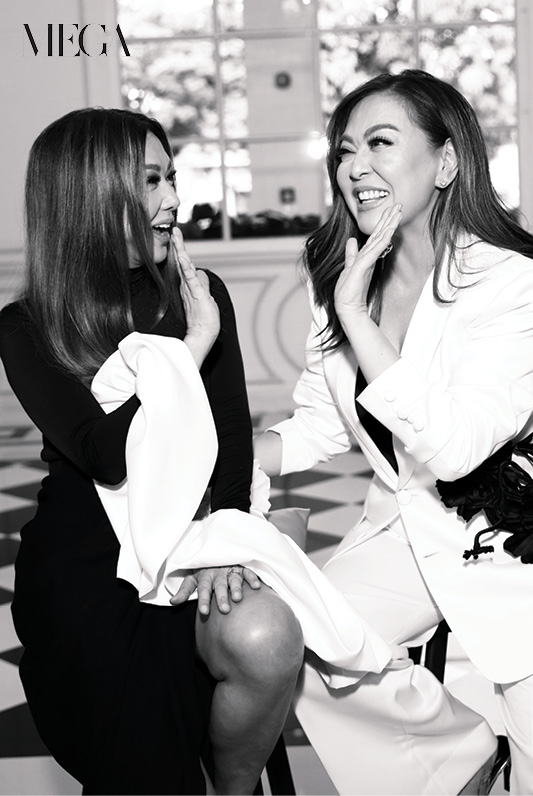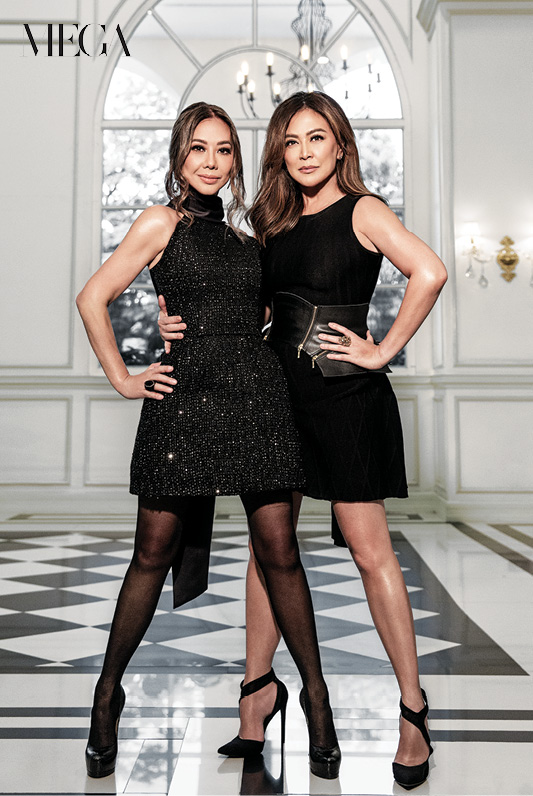This is an excerpt from MEGA’s March 2023 cover story.
Korina
It’s easy to get someone’s sense of self and aspirations through comprehending the people she looks up to. For women, who have only been surrounded by the values of inclusivity and fairness in the recent decades, finding an influential person who is relatable can empower and inspire them to dream greater.
In the case of journalist Korina Sanchez-Roxas, her biggest influence was her mother, Celia Baluyut Sanchez, whom she calls a Renaissance woman. Celia was good at everything she set her mind to doing, Korina recalls, from cooking to homemaking, to building a business and growing it.
“I thought she would live forever,” Korina tells MEGA magazine. “Well, she lives in me, and will live in my daughter, Pilar.”
Other women she looks up to include television host and philanthropist Oprah Winfrey, for fighting racism, building an empire from nothing, and making a difference; primatologist and conservationist Dian Fossey, who lived and died for animal rights; Queen Elizabeth for “harnessing the fallibilities of every human around her”; and a woman whom she met 25 years ago. The woman has six children, who then would then take turns wearing a single pair of rubber slippers to school. Today, the children all have college degrees.
“Our country is filled with women heroes,” Korina says. “A woman hero may be living next door.”
But don’t mistake aspirations as a reason to resort to imitation, the journalist cautions. While she reveres these powerful women, she says every person’s uniqueness comes from their ability to adapt instead of following someone’s life pattern—to take the good deeds and traits of these aspirations and bring them a notch higher or deeper.
“Greatness is relative,” she explains further. “It is relative to the times, circumstance, beholder. You put a child through school and you are great in the eyes of the child and God. That is great. Not everyone is expected to be a Florence Nightingale or Mother Teresa.”
Karen
In another lifetime, Karen Davila could be a fashion designer in New York City, like one of her idols Donna Karan.
“I absolutely loved Donna Karan,” she tells MEGA magazine. “She invented the body suits in the ’80s. That was the other life I dreamed of. But God chose this for me.” It wasn’t a dream prompted by the impulses of a teenager. In fact, when Karen finished high school, she applied at the Parsons School of Design in New York City, on full scholarship.
“My parents couldn’t afford it,” she recalls. “They were broke at that time, and I was rejected. I thought my life would be over. So, I asked, ‘What course would I take?’ I took up mass communication at the University of the Philippines, as the second choice, because I love to write.”
While in college, one of her professors suggested that she take the path of broadcast journalism or work on television, because she speaks clearly and fluently. By the time she was 23, she was already hired as a news anchor for a now defunct morning show of GMA.
“I would be researching my own reports, coordinating my own reports, transcribing my own interviews, editing, and writing all my documentaries,” she says. “I never had somebody to write for me—I mean, not as a practice. Sometimes, they would make me voice something because they wanted the anchor to voice it, but all my life, I’ve always written my own stories. And I’ve been in journalism for 30 years.”
Women For Women
The relationship among women has been, for centuries, fodder for gossipmongers. In the voyeuristic nature of humanity, it is the women who had to bear the brunt of this unfortunate detail. Not anymore, or at least, not so much anymore. In modern society, women stand beside each other, conquering outdated concepts, sexist notions, inequality, and discrimination. Anyone who thinks otherwise lives in the past. In this modern society, women fight for women.
WHY DO YOU THINK WOMEN ARE STILL PITTED AGAINST EACH OTHER?
KORINA: I can’t relate. I never pit women against other women. I hardly engaged in, otherwise, maybe somewhat enjoyable but useless, gossip—because I was just enslaved by my drive in my work. When I hear of such stories, I listen and understand, maybe chuckle for a second and disengage.


KAREN: At work, historically, the main anchors for news were men. So, the opportunities of anchoring for women, I wouldn’t say were limited, but you could count them. There would only be two major newscast, one primetime, and you’d probably have one woman each, or two women in each. I would have to say it was unfortunate that that happened, but in the end, it builds you also as women. You become sharper, better. You know, threatening women is so old-school. It’s not commonly done to men.
WHAT CAN YOU SAY TO PEOPLE WHO STILL DO THIS?

KORINA: Historically, women’s right to rise up and be taken seriously evolved much more belatedly. So, it is still latent in culture, then passed on, I guess, that some still enjoy a good female mud wrestling. Hormonally speaking—haha!— women are just scientifically wired to be more emotional. You can’t ignore that fact. So maybe it is a matter of being aware of yourself as a woman, to be brave enough to know and accept a few things and be strong enough to adjust. Passion is best directed towards what’s productive, rather than towards back-biting or hair-pulling. By the way, men do it against other men all the time, too. They’re often just less noisy about their games and the competition. People like to pit women against each other for entertainment. Let’s not give them that pleasure and avoid putting on the show.
KAREN: Well, it starts first with us women. We really have to first ask ourselves how we treat each other. I mean, what are we like with other women? I throw this question to the women listening out there. Do you support your colleagues? Are you often threatened by them? Are you jealous of women who are more beautiful than you, thinner than you? And when you feel threatened, do you end up bad-mouthing other women? Next, look at the workplace, the women bosses. I think women bosses should set the tone right and change the game, the way it’s played. Women would be expected to, for example, wear heels or dress in a certain way, or talk in a certain way, or be a certain weight, or look a certain way. And women bosses should already also change that. We don’t have those expectations with men. I think that women bosses should set the tone by looking beyond the external. They should start it, too.
Read more about Karen and Korina’s musings on their career, family, and advocacies in MEGA’s March 2023 issue, now available on Readly, Magzter, Press Reader and Zinio.
Photography DOC MARLON
Creative Direction NICOLE ALMERO
Fashion Direction RYUJI SHIOMITSU
Beauty Direction MIA CASTRO
Styling RYUJI SHIOMITSU, BEA GUERRERO, and MIGUEL QUILANG of NEW COLLECTIVE STYLE, assisted by BITHIA REYES and NAVZ ABDURAJAK
Makeup NIZEL REDUTA (Karen) and GERY PEÑASO (Korina)
Hair NICOLE ELIZALDE (Karen) and ARTHUR TOLENTINO (Korina)
Video Production REGINA ACERON
Videography EXCEL PANLAQUE
Sitting Editors BAM ABELLON, MARIAN SAN PEDRO, and LAURD SALEN
Shot on location RIZAL PARK HOTEL
Shoot Coordination KZ FRANCISCO and MJ ALMERO
Special thanks to ETHEL ANDRES of RIZAL PARK HOTEL







